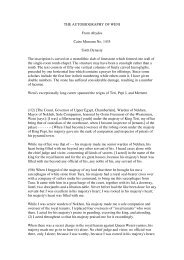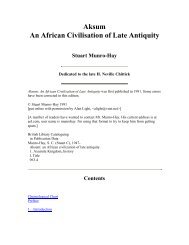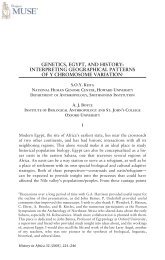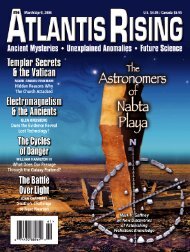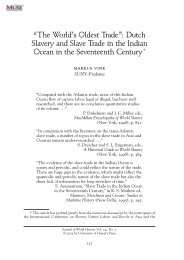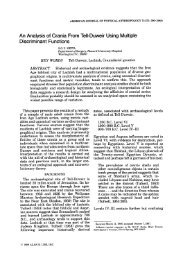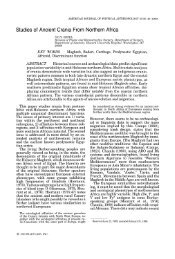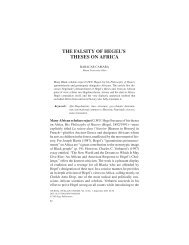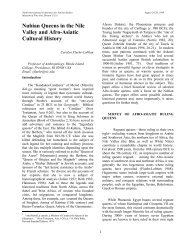The Negro trail blazers of California [microform] : a ... - Homestead
The Negro trail blazers of California [microform] : a ... - Homestead
The Negro trail blazers of California [microform] : a ... - Homestead
Create successful ePaper yourself
Turn your PDF publications into a flip-book with our unique Google optimized e-Paper software.
THE NEGRO TRAIL BLAZERS<br />
OF CALIFORNIA<br />
CHAPTER I<br />
Discovery <strong>of</strong> the Name op <strong>California</strong><br />
We are told by historians that for centuries before <strong>California</strong> was discovered every<br />
explorer started out to find the Northwest Passage to the Indies, and the seven cities <strong>of</strong><br />
Cibolia. <strong>The</strong>se cities were reputed to be rich in turquoise and gold. I think even in this<br />
day if explorers were told that somewhere, undiscovered, there were cities with houses <strong>of</strong><br />
gold and pillars <strong>of</strong> turquoise, they would sacrifice every thing, even life if necessary, that<br />
they might behold such beautiful cities on earth.<br />
Consequently, when Columbus sailed on his fourth voyage <strong>of</strong> discovery he wrote a<br />
letter to King Ferdinand and Queen Isabella (original note in "His Level Best" by Hale).<br />
This letter contained the following in regard to the South Seas, then undiscovered, and<br />
known to us as the Pacific Ocean: "I believe if I should pass under the Equator in arriving<br />
at this high region <strong>of</strong> which I speak, I should find a milder temperature and a diversity<br />
in the stars and in the waters. Not that I believe that the highest point is navigable,<br />
whence these currents flow, nor that we can mount them, because I am convinced that<br />
there is the Terrestrial Paradise, which none can enter but by the will <strong>of</strong> God. '<br />
Immediately following Columbus's letter, Mr. Hale quotes from Dante's "Divina<br />
Comedia," and Longfellow's Notes to the "Purgatories" to prove that Columbus had<br />
these writings in mind when he made use <strong>of</strong> the passage referring to the ' ' Terrestrial Paradise,<br />
which none can enter but by the will <strong>of</strong> God." <strong>The</strong> writer would not attempt to say<br />
these writings influenced his words or his great, though unsuccessful, attempt to discover<br />
the Northwest Passage or were the cause <strong>of</strong> his speaking thus, but if we follow the trend<br />
<strong>of</strong> discovery and occupation on this coast we will find Columbus's words like the notes <strong>of</strong><br />
a beautiful symphony ringing through it all— "None can enter but by the will <strong>of</strong> God."<br />
This letter was written by Columbus in the year 1503, and in the year <strong>of</strong> 1510, there was<br />
published in Spain a romance called "La Sergas de Espladian" by Garcia Ordonez de<br />
Montalvo, translator <strong>of</strong> Amadis <strong>of</strong> Gaul. In this novel the author speaks <strong>of</strong> the "Island<br />
<strong>of</strong> <strong>California</strong>." <strong>The</strong> name is spelled the same as it is today. It has been said that Cortez<br />
had the romance in mind when he discovered and named the peninsula in 1535. For this<br />
statement we have the authority <strong>of</strong> the historian Herrera.<br />
<strong>California</strong>! What a charm the name carries with it! <strong>The</strong>re seems to be a romantic<br />
inspiration in the very pronunciation, but whence did it originate We are told that for<br />
years scholars debated its origin; one tracing it to the Latin, another to the Greek, others<br />
claiming that it was given by the natives.<br />
<strong>The</strong> reading public refused to accept as satisfactory any <strong>of</strong> the statements <strong>of</strong>fered<br />
until after Mr. Edward Everett Hale read a paper before the American Antiquarian Society<br />
at a meeting held in Boston, April, 1862. In this paper Mr. Hale told <strong>of</strong> having<br />
read a Spanish romance called "La Sergas de Espladian" by Garcia de Montalvo. In this<br />
book the author speaks <strong>of</strong> the ' ' Island <strong>of</strong> <strong>California</strong>, ' ' with the same spelling for the name<br />
"<strong>California</strong>." Mr. Hale explained that the failure <strong>of</strong> the great authors to find the origin<br />
<strong>of</strong> the name "<strong>California</strong>" was because that "after 1542, no edition <strong>of</strong> the 'Sergas <strong>of</strong><br />
Espladian' was printed in Spain so far as we know until 1575, and after that in 1587,<br />
and none for two hundred and seventy years more. <strong>The</strong> reaction had come when the Curate<br />
burned the books <strong>of</strong> Don Quixote. He burned this among the rest. He saved Amadis <strong>of</strong><br />
Gaul, but he burned Espladian. We will not spare the son for the virtues <strong>of</strong> the father."<br />
<strong>The</strong>se words show Cervante's estimate <strong>of</strong> it as early as 1605.<br />
Mr. Hale further stated that when he read this romance pertaining to the Island <strong>of</strong><br />
<strong>California</strong>, and noted the similarity <strong>of</strong> spelling, there were only two copies in the world,<br />
one copy in Mr. Ticknor's collection in the Public Library <strong>of</strong> Boston, Mass., and another<br />
copy in the Congressional Library in Washington, D. C. Mr. Hale, in "His Level Best,"<br />
gives a chapter from this romance, an extract <strong>of</strong> which is now quoted:


![The Negro trail blazers of California [microform] : a ... - Homestead](https://img.yumpu.com/32436613/21/500x640/the-negro-trail-blazers-of-california-microform-a-homestead.jpg)

